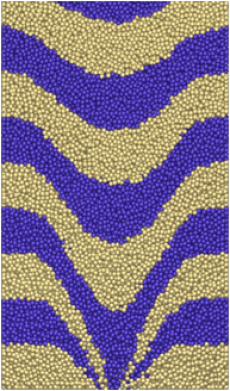Granular Flow: Coal Hoppers and Pebble Bed Reactors

Spot model software developed to control fuel mixing in a coal-fired power plant showing different colors corresponding to different coal qualities.
Granular materials, common in everyday experience, are critical in many industrial processes, and exhibit complex mixed liquid-like/solid-like behavior and microscale stress inhomogeneities. Together with Sandia National Lab, we have built large-scale simulations of an experimental pebble-bed nuclear reactor design, featuring 440,000 6 cm spherical particles that are slowly cycled through a cylindrical container, to analyze particle mixing between fuel and moderator.
Our 3D homogenized multi-scale method breaks flow into correlated motions of small groups of particles (3-5) and accurately reproduces discrete element simulations of granular hopper drainage two orders of magnitude faster. It can continuously preserve particle packing constraints during the duration of the flow and accurately track both the radial distribution function and bond angle distribution function.
The algorithm and resulting software are now used in coal power plants to do real-time control of the delivery of different qualities of coal. As an example, an Ohio plant uses RFID tags to calibrate initial free parameters.
About Berkeley Lab
Founded in 1931 on the belief that the biggest scientific challenges are best addressed by teams, Lawrence Berkeley National Laboratory and its scientists have been recognized with 16 Nobel Prizes. Today, Berkeley Lab researchers develop sustainable energy and environmental solutions, create useful new materials, advance the frontiers of computing, and probe the mysteries of life, matter, and the universe. Scientists from around the world rely on the Lab’s facilities for their own discovery science. Berkeley Lab is a multiprogram national laboratory, managed by the University of California for the U.S. Department of Energy’s Office of Science.
DOE’s Office of Science is the single largest supporter of basic research in the physical sciences in the United States, and is working to address some of the most pressing challenges of our time. For more information, please visit energy.gov/science.









